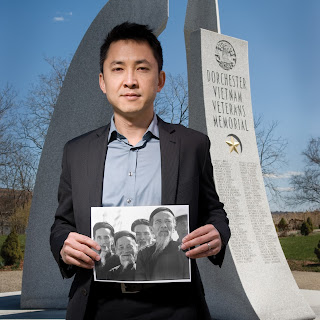Viet Thanh Nguyen and his analysis of the Vietnamese diaspora
To kick off the theme of "Borders, Boundaries, and New Frontiers", the GIP hosted its first talk of the year with Viet Thanh Nguyen, who discussed the making of his Pulitzer Prize-winning debut novel The Sympathizer and the different problems that come with writing and living as a Vietnamese-American.
Nguyen and his family fled to the United States after the fall of Saigon, settling in San Jose, California. Interestingly, he attended the same high school as one of the organizers for GIP. After receiving his Ph.D. in English from UC Berkeley, Nguyen began teaching at USC. He is currently an Associate Professor of English and of American Studies and Ethnicity at USC. His debut novel, The Sympathizer, won the 2016 Pulitzer Prize for Fiction and a long list of other awards. He also promotes Vietnamese arts and culture in the diaspora through The Diasporic Vietnamese Artists Network (DVAN) and diaCRITICS. He's also written Nothing Ever Dies, an analysis of how the Vietnam War has been remembered by the people of different countries affected. I hope to read this book soon.
During the talk, he discussed how he always felt the urge to appeal to a white audience because the publishing industry was around 80% white. However, when addressing the Vietnam War, many Americans often have a completely different perspective on these issues than Vietnamese or Vietnamese-Americans. However, with The Sympathizer, he sought to speak from a Vietnamese-American to another fellow Vietnamese-American. It was an unapologetic Vietnamese-American interpretation of the Vietnam War that did not cater to a white audience.
I unfortunately wasn't able to finish The Sympathizer before the talk, but what I have read so far has already personalized for me much of the Vietnam War and Vietnamese experience in a way nothing else that I've read has. Every page is brilliantly written--the elements of sharp humor and articulate descriptions complement well with the story about war, identity, loyalty, and understanding. (I heard that the ending of the book was the best part of the story, so I will update this blog post once I have finished.)
As a Chinese-American, I often generalize many of my issues to be that of the collective Asian-American identity. It's important for me to remember that recognizing the diversity of the Asian and Pacific Islander American (APIA) community is crucial for better understanding of the American identity and for better representation in media and in the government.
I'm excited for the release of his next book, The Refugees, which is coming out this February. The book consists of a collection of stories from people affected by the Vietnam War in different ways, whether that be through immigration or culture shock. Nguyen mentioned that he wrote this before The Sympathizer and left it untouched until The Sympathizer became widely successful and that it was written for a white audience, so I'm interested in seeing how these two fiction novels differ in their writing styles and developments because of this.
Also--I recently wrote a paper on Kissinger's influence in the White House because I wanted to learn more about normalization of Sino-US relations. As I delved deeper into his influence with Vietnam, I saw how he encouraged much of the bombings and the bombing expansion into Laos and Cambodia along with contributing to the betrayal of South Vietnam. Nguyen's take on Clinton supporting Kissinger's ideas that "America is great because it is good" was especially insightful because I never really thought about Kissinger's current connections to both Clinton and Trump. Not directly related to the talk, but interesting nonetheless.
Thank you for coming, Mr. Nguyen. You are an inspiration to not only the Vietnamese-American community (I'm sure) but also to the Asian-American community as a whole.





0 comments:
Post a Comment